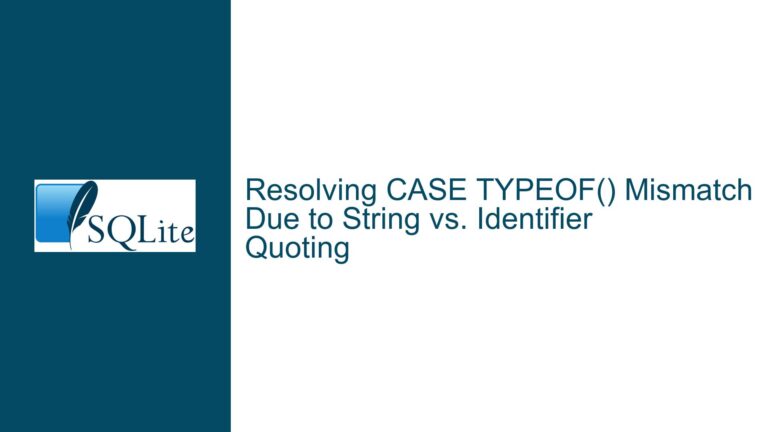Unexpected Query Results with Non-Deterministic Functions in SQLite
Non-Deterministic Functions in SQLite Queries Causing Inconsistent Results
When working with SQLite, one of the most common pitfalls is misunderstanding the behavior of non-deterministic functions, such as random(), within queries. Non-deterministic functions are those that can return different results each time they are called, even when provided with the same input. This characteristic can lead to unexpected and inconsistent query results, especially when these functions are used in Common Table Expressions (CTEs), subqueries, or filtering conditions.
Consider a scenario where a query is designed to generate a sequence of random numbers and filter them based on a specific condition. The expectation might be that the filtered results will consistently match the condition. However, due to the non-deterministic nature of the random() function, the actual results can vary significantly. This inconsistency arises because the function is re-evaluated each time it is referenced, leading to different values being used for comparison and output.
For example, a query might use a CTE to generate a sequence of numbers and then apply the random() function to each number. If the query includes a WHERE clause to filter the results based on the output of random(), the function will be re-evaluated for each row during the filtering process. This re-evaluation can result in different values being used for the comparison and the final output, leading to unexpected results.
Re-evaluation of Non-Deterministic Functions in Query Execution
The root cause of the inconsistent results lies in the way SQLite handles non-deterministic functions during query execution. Unlike deterministic functions, which always return the same result for the same input, non-deterministic functions like random() are re-evaluated each time they are referenced. This behavior is by design, as it allows for the generation of unique values or timestamps that are essential for certain use cases.
In the context of a query, this means that every reference to a non-deterministic function will result in a new evaluation. For example, if a CTE generates a sequence of numbers and applies the random() function to each number, the function will be evaluated once for each number during the generation of the sequence. However, if the same function is referenced again in a WHERE clause or another part of the query, it will be re-evaluated, potentially resulting in different values.
This re-evaluation can lead to situations where the same expression, such as random() & 3, produces different results when used in different parts of the query. For instance, a WHERE clause might filter rows based on the condition random() & 3 = 1, but the output of the query might include values that do not satisfy this condition because the function was re-evaluated for the final output.
Materializing CTEs and Using Deterministic Functions for Consistent Results
To address the issue of inconsistent results caused by non-deterministic functions, it is necessary to ensure that the function is evaluated only once and that its result is reused throughout the query. One way to achieve this is by materializing the results of a CTE or subquery, effectively forcing the query engine to evaluate the function once and store the results for later use.
In SQLite, materializing a CTE can be achieved by adding an ORDER BY clause to the CTE definition. This forces the query engine to evaluate the CTE and store its results in a temporary table, which can then be referenced multiple times without re-evaluating the non-deterministic function. For example, the following query materializes the CTE ran by adding an ORDER BY clause:
WITH RECURSIVE cnt(x) AS (
VALUES(1)
UNION ALL
SELECT x+1 FROM cnt WHERE x<100
),
ran(x) AS (
SELECT random() & 3 FROM cnt ORDER BY x
)
SELECT x FROM ran WHERE x = 1;
In this query, the ORDER BY clause ensures that the CTE ran is materialized, and the results of the random() & 3 expression are stored in a temporary table. As a result, the WHERE clause will filter the rows based on the stored values, leading to consistent results.
Another approach is to use deterministic functions or user-defined functions (UDFs) that are marked as deterministic. Deterministic functions always return the same result for the same input, ensuring consistent behavior throughout the query. While SQLite does not provide a built-in deterministic version of the random() function, it is possible to create a UDF that generates a random number once and returns the same value for subsequent calls within the same query.
For example, a UDF could be created to generate a random number and store it in a variable, which is then returned for each call to the function. This approach ensures that the same random number is used throughout the query, eliminating the inconsistency caused by re-evaluation.
In summary, the key to resolving issues with non-deterministic functions in SQLite queries is to understand their behavior and take steps to ensure consistent evaluation. By materializing CTEs or using deterministic functions, it is possible to achieve the desired results without encountering unexpected inconsistencies.






